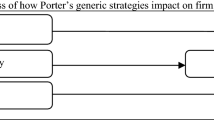Abstract
This paper is based on the results of a questionnaire sent to chief executive officers of KIBS firms in Portugal. The aim of this research is to explore the effects of knowledge, cooperation and innovation on their internationalisation strategy. The study used a quantitative approach, based on a sample extracted from the Survey of the Scientific and Technological Potential, with KIBS activity in 2014/2015. Upon the completion of data collection, systematisation of data was done through factor analysis and multiple linear regression that allowed conclusions to be drawn about the objectives proposed. On the one hand, our results show that knowledge personalisation has a positive influence on proactive strategies of internationalisation, such as external innovation and new organisation methods. When KIBS cooperate with clients, a positive impact on reactive and cost strategies of the internationalisation can be verified. On the other hand, reactive and cost strategies of internationalisation are negatively influenced by knowledge personalisation, knowledge sharing and internal innovation. This study contributes (1) to increase academic knowledge about this subject, (2) to the management practice, allowing firms to gain insights that may develop their proactive strategies of internationalisation and (3) to reinforce the need for adjustment of public policies to encourage the development and strengthening of proactivity of this sector with regard to internationalisation.


Similar content being viewed by others
References
Abecassis-Moedas, C., Ben Mahmoud-Jouini, S., Dell’era, C., Manceau, D., & Verganti, R. (2012). Key resources and internationalization modes of creative knowledge-intensive business services: the case of design consultancies. Creativity and Innovation Management, 21(3), 315–331.
Altomonte, C., Aquilante, T., Békés, G., & Ottaviano, G. I. P. (2013). Internationalization and innovation of firms: evidence and policy. Econ Policy, 28(76), 663–700.
Autio, E., Sapienza, H. J., & Almeida, J. G. (2000). Effects of age at entry knowledge intensity and imitability on international growth. Academy Management Journal, 43(5), 909–924.
Belderbos, R., Carree, M., & Lokshin, B. (2004). Cooperative R&D and firm performance. Res Policy, 33(10), 1477–1492.
Blundel, R., & Smith, D. (2001). Business network report. London: Small Business Service.
Boermans, M., & Roelfsma, H. (2015). The effects of internationalization on innovation: firm-level evidence for transition economies. Open Econ Rev, 26(2), 333–350.
Capasso, A., Dagnino G., & Lanza, A. (Eds.) (2005). Introduction: strategic capabilities and knowledge transfer within and between organizations (pp. 1–13). UK: Cheltenham.
Cassiman, B., & Veugelers, R. (2006). In search of complementarity in innovation strategy: Internal R&D and external knowledge acquisition. Manag Sci, 52(1), 68–82.
CIS (2012). The community innovation survey. Available at: http://ec.europa.eu/eurostat/documents/203647/203701/Harmonised+survey+questionnaire+2012/164dfdfd-7f97-4b98-b7b5-80d4e32e73ee
Conway, S. (2000). Social network mapping and the analysis of informal organization . Birmingham: Aston Business School, Aston University.Working paper RP024
Czinkota, M. R., Ronkainen, I. A., & Ortiz-Buonafina, M. (2004). The export marketing imperative. Australia: Thomson.
den Hertog, P. (2000). Knowledge-intensive business services as co-producers of innovation. Int J Innov Manag, 4(4), 491–528.
Di Maria, E., Bettiol, M., De Marchi, V., & Grandinetti, R. (2012). Developing and managing distant markets: the case of KIBS. Economia Politica, 29, 361–379.
DiPietro, W. R., & Anoruo, E. (2006). Creativity innovation and export performance. J Policy Model, 28(2), 133–139.
Doloreux, D., & Laperriere, A. (2014). Internationalisation and innovation in the knowledge-intensive business services. Serv Bus, 8, 635–657.
Dyer, J. H., & Nobeoka, K. (2000). Creating and managing a high-performance knowledge-sharing network: the Toyota case. Strateg Manag J, 21, 99–126.
Fernandes, C. (2011). Knowledge intensive business services (KIBS) in Portugal: location and innovative capacity. Covilhã, Portugal: Doctoral thesis, Universidade da Beira Interior.
Fernandes, C., & Ferreira, J. (2013). Knowledge spillovers: cooperation between universities and KIBS. R&D Mangement, 45(5), 461–472.
Flikkema, M., Jansen, P., & Van Der Sluis, L. (2007). Identifying neo-Schumpeterian innovation in service firms: a conceptual essay with a novel classification. Econ Innov New Technol, 16(7), 541–558.
Greco, M., Grimaldi, M., & Cricelli, L. (2016). An analysis of the open innovation effect on firm performance. European Management Journal. Accessed on 12 March 2016 http://www.sciencedirect.com/science/article/pii/S0263237316300147.
Hair, J. F., Black, W. C., Babin, B. J., & Anderson, R. E. (2014). Multivariate Data Analysis (7th ed.). Harrow: Pearson Education.
Hansen, M., Nohria, N., & Tierney, T. (1999). What’s your strategy for managing knowledge? Harv Bus Rev, 77(2), 106–116.
Hashi, I., & Stojčić, N. (2013). The impact of innovation activities on firm performance using a multi-stage model: evidence from the community innovation survey 4. Res Policy, 42(2), 353–366.
Hauknes, J. (1998). Services in innovation, innovation in services (Step report, n.13), STEP, Storgaten, Oslo, Norway.
Huang, F., & Rice, J. (2012). Openness in product and process innovation. Int J Innov Manag, 16(4), 1–24.
Johnson, B., Edquist, C., & Lundvall B. (2003) Economic Development and the National. Rio de Janeiro. Accessed on 12 March 2016 http://www.globelicsacademy.net/pdf/BengtAkeLundvall_2.pdf.
Keeble, D., Lawson, C., Smith, H. L., Moore, B., & Wilkinson, F. (1998). International processes, networking and local embeddedness in technology-intensive small firms. Small Bus Econ, 11(4), 327–342.
Kubota, L. (2009). As KIBS e a inovação tecnológica das firmas de serviços. Economia e Sociedade, Campinas, 18(2), 349–369.
Lanza, A. (2005). Managing heterogeneity, allovative balance, and behavioural and tenhonology concerns in competitive and cooperative inter-firm relationships. In A. Capasso, G. Dagnino, & A. Lanza (Eds.), Strategic capabilities and knowledge transfer within and between organizations – new perspectives from acquisition, networks, learning and evolution (pp. 17–34). Cheltenham: Edward Elgar.
Leon-Ledesma, M. A. (2005). Exports product differentiation and knowledge spillovers. Open Econ Rev, 16(4), 363–379.
López-Nicolás, C., & Meroño-Cerdán, A. (2011). Strategic knowledge management, innovation and performance. Int J Inf Manag, 31(6), 502–509.
Marques, C. S., Leal, C., Marques, C. P., & Cardoso, A. R. (2016). Strategic knowledge management, innovation and performance: a qualitative study of the footwear industry. J Knowl Econ, 7(3), 659–675.
Marques, C.S., Marques, C.P., Leal, C.T. & Cardoso, A.R. (forthcoming). Knowledge, innovation, internationalisation and performance: insights from the Portuguese footwear industry. International Journal of Entrepreneurship and Small Business.
Mas-Vérdu, F., Wensley, A., Alba, M., & Álvarez-Coque, J. (2011). How much does KIBS contribute to the generation and diffusion of innovation? Serv Bus, 5(3), 195–212.
Miles, I., Kastrinon, N., Flanagan, K., Bilderbeek, R., den Hertog, P., Huntink, W., & Bouman, M. (1995). Knowledge intensive business services. Users and sources of innovation. Brussels: European Commission.
Moreira, M. R. A., Maia, M. A. S., Sousa, P. S. A., & Meneses, R. F. (2013). Factors influencing the internationalisation of services firms: the case of design engineering and architecture consulting firms. In J. Cunha, M. Snene, & H. Novoa (Eds.), Exploring services science (pp. 246–262). London: Springer.
Muller, E., & Doloreux, D. (2009). What we should know about knowledge-intensive business services. Technol Soc, 31(1), 64–72.
Pina, K., & Tether, B. S. (2016). Towards understanding variety in knowledge intensive business services by distinguishing their knowledge bases. Res Policy, 45(2), 401–413.
Pinto, H., Fernandez-Esquinas, M., & Uyarra, E. (2013). Universities and KIBS as sources of knowledge for innovative firms in peripheral regions. Reg Stud, 49(11), 1873–1891.
Poot, T., Faems, D., & Vanhaverbeke, W. (2009). Toward a dynamic perspective on open innovation: a longitudinal assessment of the adoption of internal and external innovation strategies in the Netherlands. Int J Innov Manag, 13(2), 177–200.
Ripolles Melià, M., Blesa, A., & Dobon, S. R. (2010). The influence of innovation orientation on the internationalisation of SMEs in the service sector. Serv Ind J, 30(5), 777–791.
Rodriguez, A., & Nieto, M. J. (2010). Cooperation and innovation in the internationalization of knowledge-intensive business services. In J. Pla-Barber & J. Alegre (Eds.), Reshaping the boundaries of the firm in an era of global interdependence. Progress in international business research (Vol. 5, pp. 247–270). Bingley, UK: Emerald Group Publishing.
Rodriguez, A., & Nieto, M. J. (2012). The internationalization of knowledge-intensive business services: the effect of collaboration and the mediating role of innovation. Serv Ind J, 32(7), 1057–1075.
Salomon, R., & Shaver, J. (2005). Learning by exporting: new insights from examining firm innovation. Journal of Economics & Management Strategy, 14(2), 431–460.
Santos, J. B., & Spring, M. (2015). Are knowledge intensive business services really co-produced? Overcoming lack of customer participation in KIBS. Ind Mark Manag, 50, 85–96.
Schumpeter, J. (1934). The theory of economic development. Cambridge: Harvard University Press.
Simmie, J., & Strambach, S. (2006). The contribution of KIBS to innovation in cities: an evolutionary and institutional perspective. J Knowl Manag, 10(5), 26–40.
Sofka, W., & Grimpe, C. (2010). Specialized search and innovation performance—evidence across Europe. R&D Manag, 40(3), 310–323.
Storey, C., & Hahn, K. (2010). The role of knowledge management strategies and task knowledge in stimulating service innovation. J Serv Res, 13(4), 397–410.
Tomlinson, P. R. (2010). Co-operative ties and innovation: some new evidence for UK manufacturing. Res Policy, 39, 762–775.
van Beveren, I., & Vandenbussche, H. (2010). Product and process innovation and firms’ decision to export. Journal of Economic Policy Reform, 13(1), 3–24.
Walsh, J. P., Lee, Y. N., & Nagaoka, S. (2016). Openness and innovation in the US: collaboration form, idea generation and implementation. Res Policy, 45(8), 1660–1671.
Welch, L. S. (1992). The use of alliances by small firms in achieving internationalization. Scandinavian International Business, 1(2), 21–37.
Wu, I., & Lin, H. (2009). A strategy-based process for implementing knowledge management: an integrative view and empirical study. Journal of American Society for Information and Technology, 60(4), 789–802.
Acknowledgments
This research is supported by the FEDER component of the European Structural and Investment Funds, through the Operational Competitiveness and Internationalisation Programme’s (COMPETE 2020) Project No. 006971 (UID/SOC/04011) and the Portuguese Foundation for Science and Technology’s (Fundação para a Ciência e a Tecnologia) UID/SOC/04011/2013 Project. The authors also thank to comments given at Regional HELIX Conference 2016 – International Conference on Regional Triple Helix Dynamics. Any data or computational errors in this paper are our own.
Author information
Authors and Affiliations
Corresponding author
Rights and permissions
About this article
Cite this article
Braga, A., Marques, C.S. & Serrasqueiro, Z. Internationalisation Strategy of Knowledge-Intensive Business Services. J Knowl Econ 9, 359–377 (2018). https://doi.org/10.1007/s13132-017-0461-5
Received:
Accepted:
Published:
Issue Date:
DOI: https://doi.org/10.1007/s13132-017-0461-5




